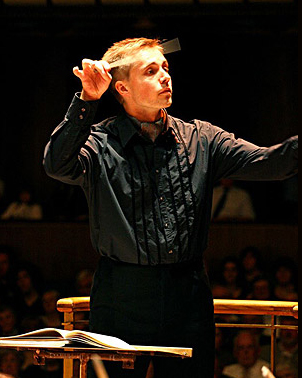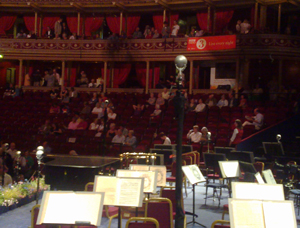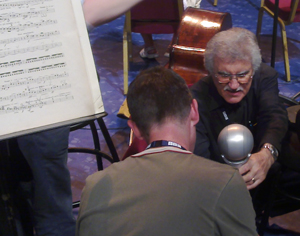The BBC's new TV dawn for the Proms | reviews, news & interviews
The BBC's new TV dawn for the Proms
The BBC's new TV dawn for the Proms
For the 2010 Proms, the BBC has introduced new techniques and new technology
For the couch-bound classical music lover, keeping up with the Proms is pretty straightforward. Step one: open bottle of agreeable claret. Step two: turn on Radio 3 and listen, or watch selected Proms on BBC Two or BBC Four. Or, indeed, catch up on the iPlayer. But needless to say, there's a colossal amount of work going on behind the scenes to make it all happen.
Round the back of the Albert Hall for the duration of the Proms season is the BBC's Truck City, a fenced off enclosure crammed with outside broadcast vehicles, stuffed with all known gadgetry for recording and mixing sound and vision. Last Monday, it was here that I met Simon Broughton as he was preparing to direct BBC Two's live recording of Prom 4, comprising Schumann's Manfred Overture, Rachmaninov's beloved Piano Concerto no. 2, and Tchaikovsky's Manfred symphony, under the baton of Vasily Petrenko (pictured below).
 That evening, Broughton would command his team of cameramen and technicians from inside a sleek, silver air-conditioned truck, more like one of McLaren's Grand Prix motorhomes than the ramshackle recording vehicles of yesteryear. But first, he took me inside the Albert Hall to show me one of the experimental innovations the BBC has introduced to its Proms TV coverage for 2010. It's the Q-Ball camera, a spherical device resembling a webcam that's been blown up to the size of a large grapefruit. Planted at strategic points onstage and operated by cameramen working backstage using remote controllers, the Q-Balls allow hitherto unknown access to classical performances.
That evening, Broughton would command his team of cameramen and technicians from inside a sleek, silver air-conditioned truck, more like one of McLaren's Grand Prix motorhomes than the ramshackle recording vehicles of yesteryear. But first, he took me inside the Albert Hall to show me one of the experimental innovations the BBC has introduced to its Proms TV coverage for 2010. It's the Q-Ball camera, a spherical device resembling a webcam that's been blown up to the size of a large grapefruit. Planted at strategic points onstage and operated by cameramen working backstage using remote controllers, the Q-Balls allow hitherto unknown access to classical performances.
"The idea is to bring more drama and access to the broadcasts," says Broughton. "There's no point in having interesting cameras just for their own sake. It's got to help to take you inside the music or inside the characters in the orchestra [the Royal Liverpool Philharmonic, in this case]. For instance, during the interval we'll have a filmed interview with the double bass player, and in the performance we'll pick her up with a Q-Ball shot. We'll have another camera looking down the length of the piano and it really takes you closer to the pianist, Simon Trpceski. It adds a dramatic ingredient and brings viewers closer to the action."
The driving force behind the Beeb’s surge into new technologies is Jan Younghusband, who was appointed Commissioning Editor, Music & Events earlier this year. She has already made her presence felt with the recent wide-ranging opera season, and was determined to bring something extra to the Proms.
“People absolutely love the Proms, and you feel you want to do your best to capture the atmosphere of that,” says Younghusband, who’s on something of a mission to make classical music reach broader audiences. “My mantra to myself is that the TV coverage needs to be better than being there, in a way. Because you haven’t got a ticket you don’t want to feel that you’re in second place because you’re watching it at home. So the television coverage should be as special as seeing it in the hall, but it’s obviously not the same experience.
"Also, if you’ve been to the concert and were sitting in the back row of the gods or whatever, you can come home and see it on iPlayer and experience the whole thing twice. In addition you get all these brilliant interviews, you’re meeting the artists, hearing the musicians talk about their work, and you can email in your questions.”
As well as encouraging greater integration between the Radio 3 and TV coverage, and working to establish differences of tone between the way BBC Two and BBC Four cover the Proms, it was Younghusband who suggested that they investigate the use of new equipment, and on an afternoon in April the BBC Concert Orchestra was used as a test bed. In addition to the Q-Balls, the assembled directors and technicians tried out a Furio Cam (which runs on tracks and will be used by Broughton in the Russian-themed Prom 46), and another camera which moves up and down on a rod.
Younghusband is very smitten with Spidercam, which flies on wires and has already been used to cover rugby, “but it’s £50,000 a day to rent so we just can’t afford it.” She also has her eye on an especially tiny camera slung on a kind of fishing rod, so small and light that it effectively becomes invisible. However, budgets dictated that much of this stuff will have to wait, and the Q-Balls became the main new addition. “I’m keeping my fingers crossed that it works, because otherwise I shall get royally told off,” says Younghusband. “Until you try, you don’t know.”
While Broughton used a brace of Q-Balls alongside conventional full-sized high definition cameras, two days later director Jonathan Haswell took the plunge and filmed the all-Beethoven Prom 6 with 13 Q-Balls planted around the stage. Haswell had already got his eye in by directing the Meistersinger performance starring Bryn Terfel last Saturday, but he was well aware that the Q-Ball experiment was posing a different set of questions. He had to get his hands on enough of them, to start with.
"Most of the Q-Balls were in South Africa for the World Cup," he reports. "They hung them in the goals see the ball coming into the net." You'd have thought that might have been handy for England against Germany, but sadly not. "When I originally asked for 15 of them there was much sucking of teeth and 'ooh! Dunno if we can do that', but they shipped back as many as they could with some urgency." (Q-Ball pictured below, on the Albert Hall stage)
 Haswell had calculated that the Beethoven Prom, featuring pianist Paul Lewis, was a suitable case for the Q-Ball treatment "because it comprises two piano concertos and two overtures, and that's very contained. It wasn't a big romantic symphony with extremely long phrases and the kind of thing that requires sweeping grandeur in the shots. It's classical music, in the strictest sense.
Haswell had calculated that the Beethoven Prom, featuring pianist Paul Lewis, was a suitable case for the Q-Ball treatment "because it comprises two piano concertos and two overtures, and that's very contained. It wasn't a big romantic symphony with extremely long phrases and the kind of thing that requires sweeping grandeur in the shots. It's classical music, in the strictest sense.
"It's usually quite short phrasing, and lots of musical question and answer. When the piano plays a phrase and the oboe responds with the same phrase, I can cut between them quite freely in a way that's often very tricky in standard coverage."
The chief advantages of the Q-Balls is that they offer intimacy and a close contact that's impossible with large conventional cameras with their human operators attached. On the other hand, they offer noticeably lower image quality, especially in low light conditions, but part of Haswell's thinking was that by using them exclusively, he'd avoid having to cut between Q-Ball footage and super-quality high-def material. He also decided that all his cameras would be onstage looking outwards, rather than using any Q-Balls for long-range wide angle shots which would, as he put it, "frankly look shite."
"Whenever a new format comes in it develops its own style," says Haswell. "A viewer can look at a high definition picture for a long time because it gives you so much detail to explore. When you have a low grade picture you'll get bored with looking at it unless there's real action and content within the frame, and you'll notice the poor quality."
While the introduction of new technology can bring fresh levels of detail and involvement to concert coverage, it doesn't replace the core skills required by the production team. It was an education to sit inside the BBC truck while Simon Broughton marshalled his forces during the Monday afternoon Prom rehearsal, tweaking camera angles and the content of each shot ("that could be a little faster, Vince, I want you to feel it naturally"), weeding out the bits that didn't work ("it was shot 101 that was so repulsive, with the clarinet") and smoothing out transitions ("Eric, we can see you there, can you keep down until the end of the shot?")
There was a moment of light relief when presenter Katie Derham ran through her link about Rachmaninov. “’He had extremely large hands with a gigantic finger stretch which meant he could play intervals of over an octave…’ We might tweak that so I don’t giggle.”
Broughton admits he’d be lost without production assistant Judy Chesterman, who coolly calls out each camera shot (744 of them in Prom 4), or his speed-fingered vision mixer Martin Jessop. Or of course the squad of battle-hardened cameramen inside the hall, like fabled veteran Dan Scala (pictured below, adjusting Q-Ball camera).
Like Haswell, Broughton has been shooting Proms since the mid-Nineties, and has amassed enough experience to make a panic-evoking task look fairly easy.
 “It was a big deal doing a Prom in those days because there were far fewer of them,” Broughton recalls. “They would start you out by giving you one piece in another director’s Prom, so I was Humphrey Burton’s student when he was at the BBC. He was a great Proms director and he taught me a lot of things.
“It was a big deal doing a Prom in those days because there were far fewer of them,” Broughton recalls. “They would start you out by giving you one piece in another director’s Prom, so I was Humphrey Burton’s student when he was at the BBC. He was a great Proms director and he taught me a lot of things.
"The first one I did was the Grieg piano concerto. I took my script to Humphrey, and he talked me through it and said, ‘I wouldn’t do that, that’s not going to cut terribly well with that.’ One thing I really remember him saying was about shots that move. He’d say, ‘if you write in a shot that moves let it get where it’s going and make a point of going there’. A lot of people cut off as soon as it gets there, rather than allowing something to happen.”
Apart from the demands of directing a live shoot, there's a couple of weeks' preparation involved for every concert, starting with close scrutiny of the musical scores to select key dramatic moments or changes of tempo. A bit of inside knowledge comes in handy here. For instance, a first-timer might not realise that “there are lots of notes on the horn, especially if the music is jumping fourths or fifths, where the players don’t move their fingers at all. If you want to see their fingers moving you need a passage where the notes move adjacently or chromatically.” Or again, if you want to shoot some fast bow-work from the violins, avoid passages with slur marks “because that means they’re all done in one bow movement, and if there aren’t slur marks the bow will be moving much faster.”
The mixture of solid experience and sparkly new tech is all part of the process whereby, as Jan Younghusband puts it, the BBC is “trying to turn the concerts into real stories for television. Obviously the Proms have used certain technologies in the past. It’s the crown jewels, if you like, of our classical music output, so we felt it would be interesting to embrace the new technology and see how it could deliver the performances in a fresh way for the viewer.”
- The Proms are broadcast live daily on Radio 3
- Prom 6 is broadcast on BBC Four tonight (23 July) at 7.30pm. Prom 4 is broadcast on BBC Two tomorrow at 7pm
- Find Paul Lewis recordings on Amazon
- Find Vasily Petrenko and the RLPO on Amazon

Comments
...
...
...